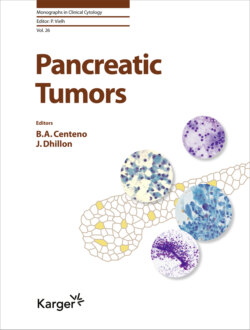Читать книгу Pancreatic Tumors - Группа авторов - Страница 14
На сайте Литреса книга снята с продажи.
Rapid On-Site Evaluation
ОглавлениеRapid on-site evaluation (ROSE) performed by the cytopathologist at the time of an endoscopic procedure is necessary to direct the endosonographer as to whether the aspirate obtained is sufficient for a definitive diagnosis. This not only means that there is enough diagnostic material in the smears, but also that there is sufficient material for an ancillary work-up. The direct smears obtained in the endoscopy suite are quickly processed and examined by a light microscope and immediate direct feedback is provided to the endosonographer. This information assists in guiding the endosonographer to the number of EUS-FNA passes required and whether the biopsy technique needs to be adjusted in non-diagnostic aspirates to yield material for a final diagnosis. ROSE is generally performed on solid pancreatic masses and not on cystic pancreatic lesions. Non-ROSE groups were shown to have more repeat EUS-FNA biopsies than ROSE groups and this difference was reported to be statistically significant in some studies [21]. However, many recent studies have reported adequacy rates of pancreatic FNA to be similar with and without ROSE, indicating that, perhaps, at high-volume centres and in expert hands, ROSE may not be indispensable to achieve excellent results [22–24]. Up to four passes are usually recommended to get diagnostic material for pancreatic FNAs as it has been shown that the chances of aspirating diagnostic material decrease after that [25, 26]. However, certain solid neoplasms of the pancreas are desmoplastic and hence may provide few cells that could be insufficient to provide a definitive diagnosis. ROSE is particularly helpful in these cases so that more aspirates can be obtained to increase the yield for a definitive diagnosis and to ensure that the patient does not have to undergo a repeat FNA at a later date.
Table 2. WHO classifications
